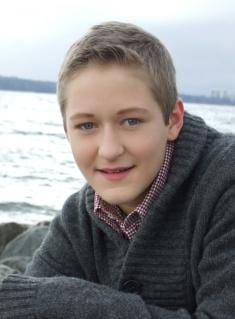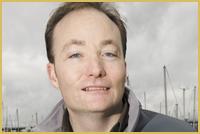
'They gave kids tools to show Cormac when he got back to school, that they were supportive of him," says mom, Julia O'Dwyer, who credits anti-homophobia consultant Steve Mulligan with creating an accepting school environment for her transgender son. Credit: Courtesy of Julia O'Dwyer
When Julia O’Dwyer’s transgendered child began transitioning in Grade 8, she wanted to make sure he would be safe to be who he is – and “hopefully be accepted.”
The Vancouver School Board’s anti-homophobia consultant, Steve Mulligan, “played a big part in making that happen,” a more than happy and relieved O’Dwyer reports two years later.
That’s why O’Dwyer went before Vancouver School Board (VSB) trustees on April 20 to make a pitch for the anti-homophobia consultant’s hours to be restored to four days a week, following news the position had been halved as part of the VSB’s proposed $18 million budget cuts.
“A lot of the time, I’m assuming, the effect this kind of a position has, is not maybe so directly felt,” O’Dwyer says.
“We were one of the [families] directly affected by his position, because he worked very directly with us when our son, Cormac, transitioned at school.”
Cormac realized he was trans after hearing a presentation from Gab Youth Services at school.
He “came home and said, ‘You know, Mom, this totally fits; this ticks all the boxes.”
From that moment, O’Dwyer says, things unfolded rapidly, leading up to a meeting with the vice-principal of Cormac’s school, Lord Byng Arts Mini, in which she signalled her son’s wish to come out.
“We really wanted the school to be on our side,” O’Dwyer says. “We felt we had to rely on them when Cormac was away from home to make sure he was safe.”
At that point, Mulligan entered the picture and began mapping a strategy to explain to teachers, staff and students what was happening.
Over a two-day period, during which Cormac was kept out of school, Mulligan, along with school officials and Gab Youth, held education sessions with the students in every class Cormac was taking.
“It’s to be expected that people are curious, and oftentimes when people learn something like that, they have a lot of questions and sometimes they don’t think before they say it. I didn’t want Cormac to be confronted with that,” she says.
“They gave kids tools to show Cormac when he got back to school, that they were supportive of him,” O’Dwyer says.
“He left on Thursday being Amber and he came back on Tuesday being Cormac.”
O’Dwyer was on a panel addressing transgender issues at the VSB the day her son returned to school.
“I had said to Cormac, ‘If anything happens, if anybody upsets you, if you feel you’ve had enough, you call me, I’ll come and pick you up,'” she remembers telling him.
Cormac never had to make that call.
It turned out to be an “absolutely phenomenal” experience for him, O’Dwyer says.
“He just walked into school and everybody said, ‘Hi Cormac,’ and that was it,” she says.
“Some of the kids, once they found out he had transitioned, they became much closer friends, and I think it was the result of he was able to be himself – finally,” she says.
“He’s never had one incident of somebody saying something to him. Nothing.
“We’ve been extremely fortunate, I feel,” O’Dwyer says.
O’Dwyer had barely five minutes to convey to VSB school trustees the significance of the anti-homophobia consultant’s position in her son’s life, and to the wider school community.
She was there at the invitation of the VSB’s Pride Advisory Committee, one of 27 groups lined up to let the board know why their programs and resources shouldn’t be reduced, or worse, eliminated altogether.
“When I went and did part of the presentation, I was a little bit concerned that people would think that this was just about me and my family, and [ask] well, ‘How many transgender people are there in this [district],'” O’Dwyer says.
“Probably more than you think, would be the answer to that,” she quickly notes.
“I think it goes much further than Steve Mulligan just having done a phenomenal job for our family,” she continues.
“If kids can learn, at the age that Cormac transitioned, to be empathetic, and to be understanding of diversity and people expressing themselves in different ways, I think that’s a really important lesson for any student – for any person, really.”
The VSB is expected to pass its final budget on Thursday, April 29.
COPE school trustee Jane Bouey says she would also like to see the anti-homophobia consultant’s four-day workweek reinstated.
As part of the Pride Advisory Committee’s presentation, the BC Teachers Federation’s James Chamberlain enumerated a partial list of the anti-homophobia consultant’s responsibilities. It totalled 16 areas, including acquiring and distributing anti-homophobia resources for schools, coordinating with other queer organizations to provide programs for VSB students and queer youth, running workshops about homophobia and transgender student support for school counsellors, teachers and administrators, and working with students to plan and run gay-straight alliance events and networking sessions.
“What went through my mind when I was listening to [the presentation],” Bouey notes, “was how difficult it was going to be for Steve, or whoever would be in that position, to be able to provide the kind of support and do the kind of extraordinary work he’s been able to do with such reduced time.”
Having the anti-homophobia consultant’s hours restored is something she’s “definitely going to bat for” come the final budget vote on April 29, but she admits it’s hard to say if the time lost will be reinstated.
Unless there’s a major shift, Bouey says, she will not vote for a budget that has cuts to students that are most vulnerable and most at risk.
“Discrimination of any kind is not acceptable. We believe schools should be welcoming environments for all students and should provide supports for all students to be successful,” the education ministry stated in an April 28 email to Xtra when asked if the anti-homophobia consultant’s position is considered an important priority.
“Our government passed legislation requiring codes of conduct in every school district and boards of education are free to determine how best to meet the unique needs of their communities,” the statement added.
That legislation was passed in May 2007.
Three years later, only eight out of 60 school districts have explicit anti-homophobia policy in place. Another 45 have yet to address homophobia at all or move beyond a generic statement about bullying.
Bouey says she’s by no means the only trustee that wants to improve the anti-homophobia consultant’s hours.
“In terms of preference, I certainly support [the anti-homophobia consultant’s position],” says NPA school trustee Ken Denike. “It was our board that basically got the position going in the beginning,” he notes.
But Denike says he’s “not quite sure what we can do about it given the budget situation.”
The position has produced “exceptionally good” results, and it’s “extremely unfortunate” that cuts to the position’s hours are being made, he says.
There are cuts to other programs that are equally required in the school district, he points out.
“It’s difficult to say that that particular cut shouldn’t be made.”
Denike says he will vote for bumping the position’s hours back up to four days per week “if we have the funds to do it.”


 Why you can trust Xtra
Why you can trust Xtra


